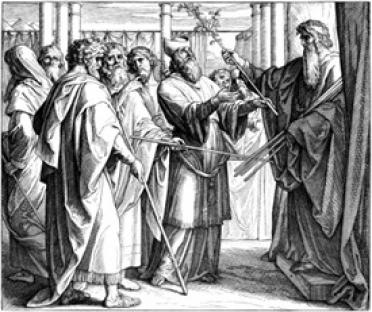Every week, parshaoftheweek.com brings you a rich selection of material on parshat hashavua, the weekly portion traditionally read in synagogues all over the world. Using both classic and contemporary material, we take a look at these portions in a fresh way, relating them to both ancient Jewish concerns as well as cutting-edge modern issues and topics. We also bring you material on the Jewish holidays, as well as insights into life cycle rituals and events...
This week, in Israel, we read Parshat Korach, while in the Diaspora the Parsha before that, Shlach, will be read. I have always been intrigued by the connection between these two portions. Both are tragic stories: in Shlach, the spies sent by Moshe in preparation for the Israelite’s entering and taking possession of the Land of Israel fail miserably, and return to camp with a message of fear and defeatism: we can not defeat the Canaanites, we should go back to Egypt. In Korach, we read of the rebellion against Moshe and Aharon led by the Levite Korach. He claims that Moshe has wrongly taken the leadership roles for himself and his brother (and, according to a Rabbinic interpretation, some other Levites), and demands that these positions be given to others.
The first sin, that of the spies, leads to God decreeing that the nation, clearly not ready to take possession of the Land of Israel, wander in the desert for forty years, until the last of this defeatist generation die, and a new generation can take over and possess the land. Korach and his band are destroyed for their rebellion against Moshe and Aharon; the earth dramatically swallows them up.
Beyond the obvious fact that both parshas recount tragic failures, misguided challenges to the leadership of God, Moshe, and Aharon, there is something more that links these two stories together: both the spies and Korach are actually telling the truth; their positions are not exactly incorrect. The Canaanites really were a frighteningly powerful enemy that, in military terms, the band of ex-slaves could not reasonably expect to conquer. Korach also has a point. When he claims that “the entire community is holy…why do you lord it over the congregation of God?” he is technically correct: the entire nation did, in fact, stand at Mt. Sinai, and coulod be seen as being as special as Moshe and his high-priest brother. In addition, his claim that Moshe played favorites in some of his appointments to the Levite leadership is also, on the face of it, not without merit.
It would seem therefore that, in both instances, the simple truth is not enough. The spies may have presented a technically truthful report about their military chances against the Canaanites. However, they neglected to factor in other crucial details: God’s support for the people, His record of miraculous assistance to them, and the fact that His special relationship with Israel had successfully gotten them this far. This deeper truth, the truth of God’s commitment to bring the Israelites back to the Promised Land, should certainly have been factored in to their assessment of their chances with the Canaanites.
Similarly, Korach failed to recognize God’s hand in choosing Moshe and Aharon as leaders. Yes, there are others who might, technically, have claims to leadership positions, but God, and what God has made happen until now, has made it clear what His leadership choices are. The leaders He has chosen have lived up to the demands their roles have made on them, they are doing what God commanded them to do, and Korach should have taken that into account.
Truth is often hard to get at. Reasonable people often argue about what really happened, what is happening now, and how we should behave in light of reality as we see it. The stories of the spies and of Korach show us that there is very often a deeper truth, a more profound reality, which needs to be taken into account when trying to figure out what is going on, what is right and what is wrong, and what we should do about it. There may also be deeper, counterbalancing truths at work in other ways: the truth of Korach’s selfish motivation in making these claims, which is illustrated by some of the language he chooses, or the truth of the cowardice of the spies, perhaps indicated by some of their overblown language (“the nation we saw were of great stature…we were, in our own eyes, like grasshoppers, and so we were in their eyes”).
In both these stories, the deeper truths behind the claims of Korach and the spies was to be found in their own shortcomings. The positions of God and Moshe, which were being challenged, also need to be understood in a deeper way. Their truth is ultimately rooted in a spiritual dimension; an understanding that there were imperatives other than those immediately obvious to us, which needed to be factored in before making a decision about what to do: the relationship between God, the Jewish people, and their destiny. This is not to say that the claim to know of a deeper, hidden, more spiritual reality will always trump the evidence of our eyes and ears. Rather, it is a challenge for us to understand that, to get to the truth, to understand what is really going on, we often need to go deeper, think harder, look more closely, and feel more sensitively.
Shabbat Shalom,
Rabbi Shimon Felix



Get inspired by Korach Divrei Torah from previous years